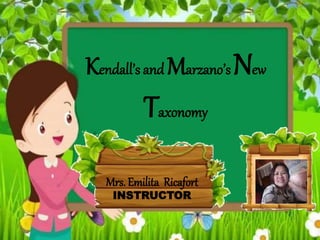
Kendall's and Marzano's New Taxonomy ppt
- 1. Kendall’s and Marzano’s New Taxonomy Mrs. Emilita Ricafort INSTRUCTOR
- 2. Lets Play “Know me then Level me”
- 3. Kendall’s and Marzano’s Taxonomy defines the manner in which each of its six levels interacts with the three knowledge domains. New Taxonomy is a two-dimensional model with six categories of mental processes represented by one dimension and three domains of knowledge represented by the other dimension.
- 4. Three different Types of Domains of Knowledge: 3. Psychomotor Procedures 1. Information 2. Mental Procedures
- 5. THE DOMAIN OF INFORMATION The domain of information, sometimes referred to as declarative knowledge, Declarative knowledge can be considered the “what” of human knowledge. Content knowledge
- 6. THE DOMAIN OF MENTAL PROCEDURES Mental procedures—sometimes referred to as procedural knowledge Procedural knowledge can be described as the “how-to.”
- 7. THE DOMAIN OF PSYCHOMOTOR PROCEDURES As the name implies, the psychomotor domain is composed of physical procedures an individual uses to negotiate daily life and to engage in complex physical activities for work and for recreation.
- 8. There are three systems of New Taxonomy 1. Self-System 2. Metacognitive System 3. Cognitive System
- 9. Self- System The self-system consists of an interrelated arrangement of attitudes, beliefs, and emotions Metacognitive System Has been described by researchers and theorists as responsible for monitoring, evaluating, and regulating the functioning of all other types of thought. Cognitive System Oriented toward human skills and capabilities. They can perceive and understands things, draw conclusion and learn
- 11. LEVEL 1: RETRIEVAL (COGNITIVE SYSTEM) At this level, learners recognize, recall, or execute basic information and processes. Retrieval involves the recognition and recall of information and the execution of mental procedures and psychomotor procedures. RECOGNITION Defined as the simple matching of a giving prompt or stimulus with information in permanent memory.
- 12. RECALL Involves generating as opposed to simply recognizing information. EXECUTE Information is recognized and recall.
- 13. LEVEL 2: COMPREHENSION (COGNITIVE SYSTEM) At this level, learners distill knowledge to its organizing essence. This level involves determining the defining characteristics of the information that learners can combine as knowledge of something. It is the lowest level of demonstration of understanding. It involves the processes of integrating and symbolizing.
- 14. INTEGRATING Involves reducing knowledge down to its key parts. SYMBOLIZING Involves depicting knowledge in some type of nonlinguistic or abstract
- 15. LEVEL 3: ANALYSIS (COGNITIVE SYSTEM) Analysis processes all involve examining knowledge in fine detail, and a result , generating new conclusions. This level involves matching and classifying activities, analyzing errors, generalizing from foundational knowledge and specifying logical consequences.
- 16. MATCHING Involves identifying similarities and differences. CLASSIFYING Refers to organizing knowledge into meaningful categories. ANALYZING ERRORS Involves identifying factual or logical errors in knowledge or processing errors in the execution of knowledge.
- 17. GENERALIZING Involves the construction of new generalizations based on prior learning. SPECIFYING It relates to principles involves making and defending predictions about what will or might happen under certain conditions.
- 18. LEVEL 4: KNOWLEDGE UTILIZATION (COGNITIVE SYSTEM) At this level, learners use the knowledge to accomplish a specific task. This level involves the processes of decision making, problem solving, experimenting, and investigating.
- 19. DECISION MAKING Involves selecting among alternatives that initially appear equal. PROBLEM SOLVING Involves accomplishing a goal for which obstacles or limiting conditions exist. EXPERIMENTING Involves the generation and testing of hypotheses about a specific physical or psychological phenomenon. INVESTIGATING Involves examining a past, present, or future situation.
- 20. LEVEL 5: METACOGNITIVE SYSTEM Described by researchers and theorists as responsible for monitoring, evaluating, and regulating the functioning of all other types of thought. SPECIFYING GOALS Involves setting specific goals relative to one’s understanding of or skill at a specific type of knowledge and developing a plan for accomplishing the goals.
- 21. PROCESS MONITORING Component of the metacognitive system typically monitors the effectiveness of a procedure being used in a task. MONITORING CLARITY Involves determining the extent to which an individual is clear about specific aspects of knowledge MONITORING ACCURACY Involves determining the extent to which one is correct in terms of one’s understanding of specific knowledge.
- 22. LEVEL 6: SELF-SYSTEM THINKING Consists of an interrelated arrangement of attitudes, beliefs, and emotions. It is the interaction of these attitudes, beliefs, and emotions that determines both motivation and attention. EXAMINING IMPORTANCE Involves analyzing the extent to which one believes that specific knowledge is important.
- 23. EXAMINING EFFICACY Involves examining the extent to which individuals believe they can improve their understanding or competence relative to a specific type of knowledge. EXAMINING EMOTIONAL RESPONSE Involves identifying what emotions, if any, are associated with specific knowledge and why those associations exist. EXAMINING MOTIVATION Improve one’s understanding of or competence in a specific type of knowledge. overall motivation is a composite of the other three aspects of self-system thinking—perceptions of importance, perceptions of efficacy, and emotional response.
- 24. REPORTERS Zoilo Begasa BEED 3A Miaka Balino BEED 3A
- 25. REPORTERS Jona America BEED 3A Kim Belmonte BEED 3A